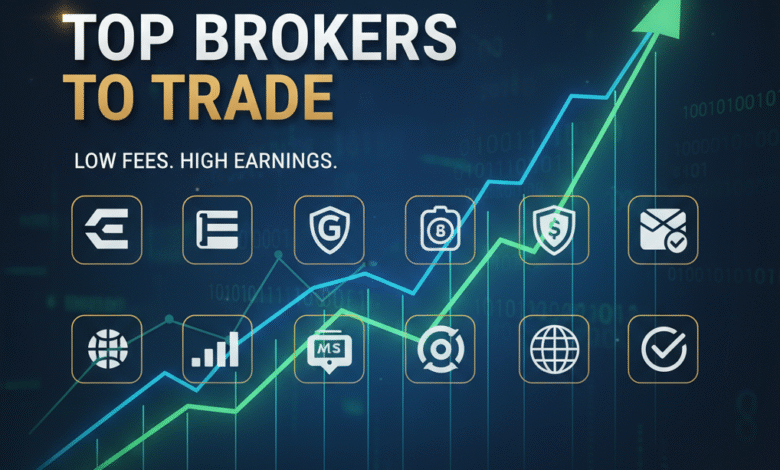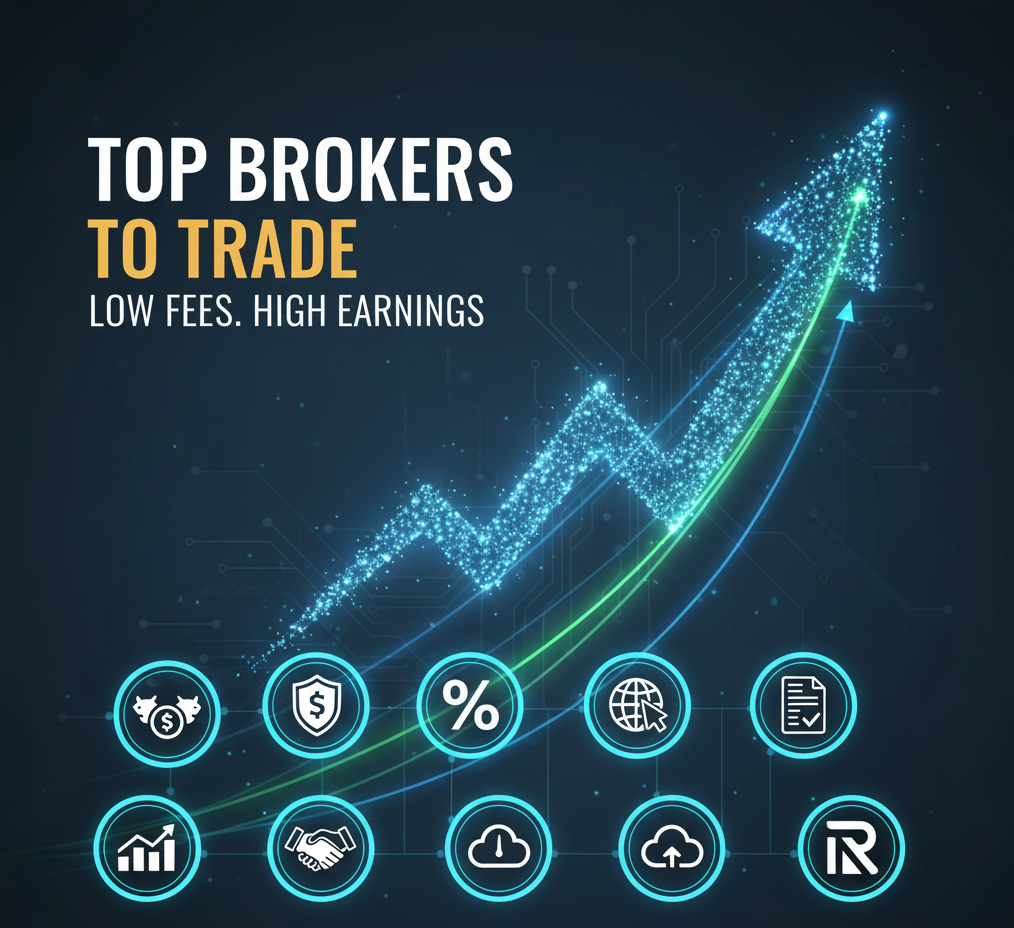Top 10 Brokers to Trade With Low Fees High Eearnings

Finding the right brokerage platform can make or break your investing journey. With countless options flooding the market, selecting from the top 10 brokers has become both easier and more challenging—easier because you have more choices, but harder because those choices come with nuanced differences in fees, features, and services.
Whether you’re a novice investor taking your first steps into the market or a seasoned trader looking to optimize your portfolio, understanding which brokerage aligns with your financial goals is crucial. In this comprehensive guide, we’ll explore the leading trading platforms, break down their key features, and help you identify the best online brokers that match your investment style and budget.
Why Choosing the Right Broker Matters
Your brokerage account is more than just a place to buy and sell stocks—it’s your gateway to building wealth. The platform you choose affects everything from the fees you pay on trades to the research tools available for making informed decisions. A poor choice can cost you thousands in unnecessary fees over time, while the right broker can amplify your returns through competitive pricing and robust features.
The brokerage landscape has evolved dramatically over recent years. Commission-free trading has become the industry standard, pushing brokers to differentiate themselves through superior technology, educational resources, and comprehensive investment options. This shift has democratized investing, making it more accessible to everyday investors while challenging established firms to innovate constantly.
The Top 10 Brokers for 2025: Our Comprehensive Rankings
After extensive analysis of features, costs, customer service, and user experience, here are the leading brokerage platforms that stand out in today’s competitive market.

1. Fidelity Investments: The All-Around Champion
Fidelity has earned recognition as the best broker for beginners in 2025, thanks to its combination of low costs, extensive research materials, educational content, and strong customer service. But don’t let the “beginner-friendly” label fool you—Fidelity offers sophisticated tools that appeal to experienced investors as well.
What Makes Fidelity Stand Out:
- Zero commissions on stocks, ETFs, and options (plus contract fees)
- Exceptional research and analysis tools
- Award-winning customer service with 24/7 phone support
- Extensive educational resources including webinars and articles
- No account minimums for most accounts
- Wide range of investment options including fractional shares
Fidelity strikes the perfect balance between simplicity for newcomers and depth for veterans. Their mobile app is intuitive yet powerful, making it easy to monitor your portfolio and execute trades on the go.
2. Charles Schwab: The Investor’s Trusted Partner
As a pioneer discount broker with over 50 years of experience, Charles Schwab offers commission-free trading on ETFs, stocks, fractional shares, and Schwab mutual funds. The firm has built its reputation on combining low costs with high-quality service—a combination that’s hard to beat.
Key Advantages:
- Comprehensive investment offerings including stocks, bonds, ETFs, and mutual funds
- Robust research platform with third-party analysis
- Physical branch locations for in-person guidance
- Excellent retirement planning tools
- Integration with checking and savings accounts
- Commission-free trading on most products
Schwab particularly excels for investors who value having access to human advisors when needed, offering a hybrid model that combines digital efficiency with personal touch.
3. Interactive Brokers: The Professional’s Choice
Interactive Brokers stands out as potentially the best commission-free ETF trading platform, offering an extensive range of ETFs for trading, including both domestic and international options, making it ideal for portfolio diversification. This platform is designed for serious traders who need advanced tools and global market access.
Why Active Traders Love Interactive Brokers:
- Access to 150 markets in 33 countries
- Extremely competitive margin rates
- Advanced trading platforms with institutional-grade tools
- Wide variety of tradable securities including stocks, options, futures, forex, and bonds
- IBKR Lite offers commission-free stock and ETF trades for casual investors
- Superior order execution and routing options
While Interactive Brokers may have a steeper learning curve than some competitors, the platform’s depth and breadth make it invaluable for traders who want comprehensive market access and sophisticated analysis tools.
4. E*TRADE from Morgan Stanley: Best for Options Trading
E*TRADE has long been a household name in online brokerage, and its acquisition by Morgan Stanley has only strengthened its position. The platform excels in options trading while maintaining broad appeal across different investor types.
Notable Features:
- Powerful options trading platform with advanced screening tools
- Excellent mobile app with full trading capabilities
- No account minimums or inactivity fees
- Comprehensive mutual fund selection with thousands of no-transaction-fee funds
- Strong educational content focused on options strategies
- Premarket and after-hours trading available
E*TRADE’s interface strikes a balance between being accessible to beginners while offering the depth that options traders demand for complex strategies.
5. Robinhood: The Innovator for Mobile-First Investors
Robinhood disrupted the brokerage industry by pioneering commission-free trading, and it remains a strong choice for investors who prioritize mobile accessibility and simplicity. While it faced challenges in the past, the platform has matured significantly.
What Robinhood Offers:
- Completely commission-free stocks, ETFs, and options trading
- Streamlined, user-friendly mobile interface
- Cryptocurrency trading integrated into the platform
- Fractional shares allowing investment with any dollar amount
- Cash management features with competitive interest rates
- IPO access for eligible customers
Robinhood works best for investors who want a straightforward, mobile-first experience without the complexity of traditional brokerage platforms.
6. Vanguard: Best for Long-Term Investors and Index Fund Enthusiasts
Founded in 1975, Vanguard is known for its low-cost investment approach, offering a wide range of products including mutual funds, ETFs, IRAs, and brokerage services. As of April 2025, Vanguard serves over 50 million clients with assets under management exceeding $10.1 trillion.
Vanguard’s Strengths:
- Rock-bottom expense ratios on proprietary funds
- Commission-free trading on Vanguard ETFs and most stocks
- Excellent retirement account options
- Strong focus on long-term, buy-and-hold investing philosophy
- Extensive educational resources about passive investing
- Client-owned structure aligns interests with investors
Vanguard may not have the flashiest platform, but for investors focused on low-cost index investing and long-term wealth building, it’s hard to find a better partner.
7. TD Ameritrade: Best for Education and Research
TD Ameritrade (now part of Charles Schwab but still operating independently) provides one of the most comprehensive educational ecosystems in the brokerage world. Their thinkorswim platform is legendary among active traders.
Key Benefits:
- Award-winning thinkorswim trading platform
- Extensive educational library with courses, videos, and webinars
- Paper trading functionality for practice
- Commission-free stocks and ETFs
- Excellent mobile app
- Strong customer service with 24/7 phone support
The platform’s commitment to investor education makes it particularly valuable for those who want to deepen their understanding of markets and trading strategies.
8. Webull: Best for Technical Analysis Enthusiasts
Webull has quickly gained popularity among traders who rely heavily on technical analysis and charting. The platform offers sophisticated tools typically found on platforms costing hundreds of dollars per month—for free.
Standout Features:
- Advanced charting with dozens of technical indicators
- Commission-free trading on stocks, ETFs, and options
- Extended hours trading
- Paper trading for strategy testing
- Cryptocurrency trading
- Active community features and social sentiment analysis
While Webull lacks some of the educational resources of larger competitors, its technical analysis capabilities are impressive for a zero-commission platform.
9. Merrill Edge: Best for Bank of America Customers
Merrill Edge performed well in 2025 evaluations, particularly for investors who already have a relationship with Bank of America. The integration between banking and investing creates a seamless financial experience.
Integration Benefits:
- Preferred Rewards program offers commission-free trades and bonuses
- Easy transfers between Bank of America accounts
- Combined view of banking and investing in one place
- Quality research from Bank of America’s analyst team
- No account minimums or maintenance fees
- Strong branch network for in-person support
The rewards program can provide substantial value for customers with significant Bank of America deposits or who make frequent trades.
10. Moomoo: Best for Data-Driven Investors
Moomoo is a relatively newer entrant that has gained traction by offering institutional-level data and analytics to retail investors at no cost. The platform appeals to investors who make decisions based on detailed financial information.
What Sets Moomoo Apart:
- Free Level 2 market data
- Professional-grade charting and screening tools
- Heat maps and unusual options activity tracking
- Commission-free stock and ETF trading
- Options trading with competitive contract fees
- Strong community features with idea sharing
Moomoo’s data-rich environment makes it particularly appealing to investors who want to analyze stocks in depth before making investment decisions.
Understanding Low-Fee Brokers: Why Costs Matter
When evaluating the best online brokers, understanding fee structures is essential. Even small differences in costs compound significantly over time, potentially costing you tens of thousands of dollars over a multi-decade investing career.
The Revolution of Commission-Free Trading
Commission-free trading has become standard across the industry, with major brokers eliminating fees on stocks, ETFs, and in many cases, options trading. This shift has saved investors billions collectively and leveled the playing field between institutional and retail investors.
However, “commission-free” doesn’t mean completely free. Brokers make money through other mechanisms:
Payment for Order Flow: Many zero-commission brokers receive payments from market makers for routing your orders to them. While controversial, this practice allows brokers to offer free trades while regulatory requirements ensure you receive best execution.
Margin Interest: If you borrow money to invest, brokers charge interest on margin loans. Rates vary significantly between brokers, so compare carefully if you plan to use margin.
Options Contract Fees: While options trades may have no commission, there’s typically a per-contract fee, such as 65 cents per contract.
Premium Services: Some brokers offer paid tiers with enhanced features, market data, or research tools.
Hidden Costs to Watch For
Beyond commissions, scrutinize these potential fees when selecting low-fee brokers:
- Account maintenance fees: Some brokers charge monthly or annual fees, though many have eliminated these
- Inactivity fees: Charges for accounts that don’t trade regularly
- Transfer fees: Costs to move your account to another broker
- Withdrawal fees: Some platforms charge for transferring money out
- Foreign transaction fees: Charges for trading international securities
- Mutual fund loads and transaction fees: Some funds carry sales charges or redemption fees
The most cost-effective approach is choosing brokers that have eliminated most or all of these fees while offering the features you need.
Key Features to Consider When Choosing a Broker
Beyond costs, several factors should influence your choice among the top 10 brokers:
Investment Options
Consider what you want to trade. All major brokers offer stocks and ETFs, but access to other asset classes varies:
- Mutual funds (and which ones are available without transaction fees)
- Options and futures
- Bonds and fixed income
- Cryptocurrencies
- Foreign markets
- Alternative investments
Platform and Technology
Evaluate whether you prefer desktop, mobile, or web-based platforms. Test the interface during a trial period to ensure it matches your comfort level. Consider factors like:
- Speed and reliability
- Charting and technical analysis tools
- Order types available
- Ease of research and stock screening
- Quality of mobile app
Research and Education
Especially for newer investors, educational resources and quality research can significantly impact your success:
- Third-party research reports
- Stock screeners and idea generation tools
- Educational articles, videos, and courses
- Market commentary and analysis
- Webinars and live events
Customer Service
When issues arise or you have questions, responsive customer service matters:
- Availability (24/7 vs. business hours only)
- Contact methods (phone, chat, email)
- Quality and knowledge of representatives
- Branch locations for in-person service
Account Types and Services
Ensure the broker supports the accounts you need:
- Individual and joint brokerage accounts
- Retirement accounts (Traditional IRA, Roth IRA, SEP IRA, etc.)
- Custodial accounts for minors
- Trust accounts
- Advisory services if you want professional management
Making Your Final Decision
Choosing from the top 10 brokers ultimately depends on your unique situation. Here’s a framework to guide your decision:
For Beginners: Fidelity or Schwab offer the best combination of ease-of-use, education, and support to help you learn while you invest.
For Active Traders: Interactive Brokers or TD Ameritrade’s thinkorswim provide the sophisticated tools and data you need for frequent trading.
For Cost-Conscious Investors: Any of the zero-commission brokers work well, but pay special attention to margin rates if you use borrowed money, and expense ratios if you invest in funds.
For Long-Term Investors: Vanguard’s low-cost index funds and philosophy align perfectly with buy-and-hold strategies.
For Mobile-First Users: Robinhood or Webull deliver excellent mobile experiences without compromising on features.
For Bank Integration: Merrill Edge (for Bank of America customers) or Schwab (for checking account integration) provide seamless coordination between banking and investing.
Taking Action: Opening Your Account
Once you’ve selected a broker, opening an account is straightforward. You’ll typically need:
- Personal identification (driver’s license or passport)
- Social Security number or Tax ID
- Employment information
- Financial information (income, net worth, investment experience)
- Bank account information for funding
Most brokers approve accounts within one to two business days, and you can often start trading as soon as your funds are available.
Conclusion: Your Path Forward
The brokerage industry has never been more competitive or investor-friendly. The top 10 brokers highlighted in this guide each offer compelling value propositions, and you genuinely can’t make a “wrong” choice among them—only a choice that’s more or less optimal for your specific needs.
Remember that you’re not locked into your decision forever. Many investors maintain accounts at multiple brokers to leverage different strengths. However, starting with one platform that aligns with your current goals and gradually expanding if needed is usually the wisest approach.
The most important step isn’t necessarily choosing the “perfect” broker—it’s getting started. Every day you delay investing is a day you miss out on potential compound growth. Pick a broker from this list that resonates with you, open your account, and begin your investing journey. Your future self will thank you for starting today.
With these best online brokers and low-fee brokers at your fingertips, you have everything you need to begin building wealth through smart, informed investing. The only question left is: which broker will you choose to partner with on your financial journey?
READ MORE : Best Brokers to Maximize Your Trading Success in 2025




